- Home
- Diana Wynne Jones
Year of the Griffin Page 11
Year of the Griffin Read online
Page 11
“He could have taken it off,” Lukin said, while Olga seemed to be shuddering faintly. “But Cyclina and The Red Book both say a jinx is usually bound up with a magic user’s actual power, and what I’m afraid of is that he took away her magic power, too.”
“But then she’d have to leave, wouldn’t she?” Elda asked, appalled. Lukin nodded.
“That is a real worry.” Olga agreed, pushing her plate away. “What have we done to deserve Wermacht? Don’t answer that question—particularly you, Ruskin. Nice try with the stew, shame about the smell and the color. Is it meant to be this slimy? Don’t you think you’d better read up a bit more, or practice somewhere else, or something?”
Ruskin sighed. “I’ve been thinking that, too. I read the books, thought it was easy, but now I think there must be more to it than that. I’ll have another go when I’ve worked out what it is.”
When everyone left the refectory, there was almost as much green stew left piled on plates or bubbling in cauldrons as there had been to start with. A deputation of students and six angry warn-spells were sent to Corkoran about it.
Corkoran told the deputation he would see about it and went to find Finn. “Look, Finn, some student’s been mucking about with the food again …” he began.
“And I’ll give you six guesses which one,” said Finn. He saw well enough that Corkoran intended him to find the culprit, and he thought that for once Corkoran could do his own dirty work. “It’ll be one of your first years, Corkoran. My money’s on your dwarf, but I’d take a side bet on Claudia. Wermacht’s been telling me she’s got some kind of jinx.”
“Has she?” Corkoran had forgotten that Claudia had told him this herself. He flicked at the violet monkeys on his tie. “Look, Finn—”
“All you have to do,” Finn cut in, “is to eat in the refectory tonight and trace the spell. It’ll be something pretty crude. It always is.”
“But I haven’t—” Corkoran tried again.
“So that’s your course of action,” Finn said firmly. “Catch the dwarf red-handed.” Seeing Corkoran about to speak again, Finn changed the subject swiftly and enthusiastically. “You know that first year of mine—Melissa? The one everyone says has no brain. I’ve just had a really marvelous essay from her, clear, concise, to the point, well thought-out, truly brilliant! If it weren’t for your policy, I’d give it an A. I think we’ve all been misjudging—”
“Yes, yes,” Corkoran said irritably. This was some kind of sore point with him, Finn could see. Probably none of Corkoran’s precious, carefully chosen first-year students was anything like as good as expected. Too busy messing with food and assassins to do any work, Finn thought. He watched Corkoran turn peevishly away. “Then if you can’t help,” Corkoran said over his shoulder, “I suppose I’d better follow your advice and get indigestion in the refectory.” He rushed moodily away with the purple monkeys flapping, while Finn did his best not to laugh. It was seldom he got the better of Corkoran.
Back in his lab, Corkoran sat at his bench with his back to the assassin cage and his moonship bulking by the windows, crying out to be worked on, irritably surveying the monstrous pile of paper his first-year students had dumped on him. Why couldn’t young people remember someone had to read their eloquence? He would have to set a word limit. This was awful. Corkoran usually reckoned to whip through all the week’s essays in half an hour or so and then get comfortably back to his lab work. Indeed, he had already whipped through the offerings from the second and third years. Sensible, slim essays, those were, full of the usual facts, none of them trying to explain the universe or anything silly like that. And he could have sworn that those six first years had been far too busy lately to cover more than one sheet with writing. Yet here was Felim producing thirty pages, Elda twenty-nine, Claudia the same, Olga twenty-six, and Ruskin forty—count them, forty! Lukin was more moderate. He had only produced ten pages, but since those were written very close in tiny black writing, Corkoran feared the worst. What had got into them all?
For an ignoble five minutes or so Corkoran contemplated simply returning the essays unread. But that was just the kind of thing that Querida could be counted on to discover. The griffin almost certainly knew Querida quite well. And the last thing Corkoran wanted was Querida turning up at the University to ask questions. He sighed and, shudderingly, picked up Felim’s monster. Compromise. Skim through. Get the gist.
This was not easy. Felim kept quoting spells, nearly all of which Corkoran had never met before. He had to keep getting up to consult the enormous Almanac of Magics on the lectern beside his moonship, to make sure that Felim was not just inventing the spells. And Felim never was. All the spells seemed to be real, but Corkoran stopped consulting the Almanac and began skimming when he realized that with each spell Felim was pointing out that there were possibilities the maker of the spell had never thought of. Different uses for them and different sorts of magic branched off from them in a hundred directions, Felim said. He ended by saying that magic could explode into a hundred new forms no one had thought of yet—except this was hardly the end. Felim spent his last three pages suggesting the forms the new magic could take, astromagic, psychomagic, metaphysical magic, biomagy, theurgy, centromagic, anthropism, numerology, ritual magic, most of which were entirely beyond Corkoran’s understanding.
He shook his head sadly. This was not modern magic. Magic these days confined itself to strictly practical things, to known facts and proven procedures. Felim argued well and wrote elegantly, but it would not do. This was some relief to Corkoran. For a while, when he first started reading this monster, he had been afraid he was going to have to break with his policy and give Felim a high mark, if only for all the research into spells Felim had done. Corkoran’s policy, as Finn had reminded him, was that the University existed these days to turn out competent magic users with the skills that were needed to reorganize the world after the mess Mr. Chesney had made of it. There was no place for deep research or Felim’s kind of speculations. What the world needed was run-of-the-mill practical magic. For this reason Corkoran had decreed that only third-year students and then only those who showed supreme practical skills should ever get an A.
He scribbled a generous B minus on Felim’s monster and “Answer the question” beside it, and turned to Lukin’s essay next because it was the shortest. And here was Lukin talking about the different possibilities of magic, too, in a soaring, joyful way that quite shocked Corkoran. He had thought Lukin was going to be one of your stolid plodders. But not a bit of it. Lukin talked about the boundaries and limitations set on magic, and while he agreed that some were there for safety, he thought most of them unnecessary. He pointed out a few. Take these off, he said. Experiment. Have fun with magic.
Fun? Corkoran thought. What nonsense was this? Magic at University level was work. You were not supposed to have fun with it. Yet here was Lukin, expressing himself rather well in his tiny black writing, suggesting that magic was there to enjoy. Well, he was a prince, Corkoran thought, and had obviously been brought up to think that magic was what you relaxed with after a day’s ruling. Corkoran decided to allow for that, and awarded Lukin a C, instead of the C minus he had first intended.
He gave Olga a C, too, again quite generously, he thought. She had at least tried to answer the question “What Is Wizard’s Magic?” But her essay was full of opinions, which again would never do. Olga’s notion was that magic could not be standardized, for the gods’ sake! Everyone’s particular magic was influenced by that person’s particular character, she said, and differed from another person’s magic in the same way that handwriting differed. Furthermore, she said, a person’s magic could be spoiled or improved by the way they were taught or by their upbringing. She gave one or two examples. Corkoran was quite struck by her account of a teenager who was punished for playing with air elementals and gradually became unable to speak to any elementals at all.
“Can anyone speak to elementals?” he murmured, and wrote “accuracy?” in
the margin there. On the whole, Olga’s offering irritated him even more than Lukin’s did. Of course magic was supposed to be standardized! Corkoran’s job at the University was to iron out all the differences in it.
He sighed and dragged Elda’s massive offering forward. Elda was on the same tracks as Felim. What had they all been reading? Elda, even more than Felim, was certain that there were great tracts of magic left unexplored, and she kept giving examples that were not even in the Almanac of magics, which she must have learned from Derk, her father. Half the time Corkoran had no idea what she was talking about. He had never heard of gene tailoring, or zygotes, or rhyzomes either. He was irritated to discover that Elda knew this and explained it all, in carefully numbered notes at the end of the huge essay. And before this Elda’s last pages went even further than Lukin had and became more or less a song of praise for magic, its excitements and its possibilities. That was enough. Corkoran scribbled a highly irritated C minus, and wondered, while he dragged Ruskin’s heap of pages in front of him, whether he ought not, in all honesty, to give this diatribe a straight D.
He was determined to skim Ruskin’s essay. But it was impossible. Ruskin was a dwarf, used to working with intricate things, and his argument was like chain mail, forged link by link. He put out a suggestion. He followed that with obvious things that led from it—things you were forced to agree to—and then he went one stage further and Wham! you were agreeing to something that was quite unheard of. Then Ruskin took the unheard-of idea and did the same to that. Wham. A new mad idea. Around and around the links Corkoran went, up and through and wham! through the first twenty pages. By this time he found he was humbly agreeing to a complete reorganization of the University syllabus, with theory and practical being taught together, to give more space for hugely advanced theory, and the first-year course beginning where the third year’s left off; and agreeing then that magic as used today was being handled entirely wrongly and should be rethought from the bottom upward....
Corkoran left off reading and gave Ruskin a C. Then, after some thought, he made that C minus for bossiness. It was as if the wretched dwarf was teaching him instead of the other way around. He wanted, even more than he had with Elda or Olga, to give the essay an F for failed, but some of Ruskin’s arguments were so persuasive that Corkoran actually caught himself wondering if perhaps, maybe, he should rethink his moonshot methods.
He shoved the forty pages angrily away and snatched up Claudia’s offering, which he had left until last because it looked peculiar. A glance at the light showed him that he was not going to get any of his own work done now before refectory supper, so he supposed he had better give his full attention to this now. It seemed to be a mass of fluttering paper slips held together by adhesion spells.
It was very peculiar. Claudia evidently held the same opinion as Felim and Elda, but she had set out to prove her opinion practically, by starting with a fairly common spell and showing how it could be made to do two different things. The first page gave the spell and then was divided into two columns, showing the two new spells. These in turn led to four—no, five—more derived spells in four columns and an attached slip of paper. And so on. Ten columns led to twenty-five.... Help! thought Corkoran, leafing on to find pages with up to fifty columns, done in tinier and tinier writing and only readable because Claudia had fitted them with an expander spell that Corkoran himself had never learned to cast. And as if this was not difficult enough—though it seemed to be meant to be helpful—the last page folded out into a huge family tree of all the spells, their branches color-coded red, green, and blue, with extra notes about how to apply them all.
“And I have to check all this?” Corkoran said aloud. Yes. Obviously he did. Claudia could be fooling him by writing complete nonsense. It took him well over an hour. When he was done, he could not help feeling an irritated sort of admiration. Some of those fifty new spells were good, new, useful things, and deriving them all from just two simple ordinary spells took a perverse sort of genius. But it was all as unheard of as Ruskin’s ideas. And it was not a proper essay. Corkoran turned the fluttering mass over and wrote “C–. Answer the question.” Genius or not, Claudia had wasted her time and his, and besides, even a genius can always do better. Perhaps he would give Claudia an A if she did this again in two years’ time. Or perhaps not. He did not want any of his students going out into the world thinking they could work marvels.
It was sad, really, Corkoran thought as he stacked the steep stack of papers together. Young people came to the University full of such bright hopes, feeling the whole world was open before them. And by the end of three years most of them were simply competent magic users, scraping around to find employment that made them some money. He remembered being like this himself even. Right at the start of his first year he had thought that magic offered great things—though he could not remember now what things—and by the end he had felt he was lucky to get a job on Mr. Chesney’s tours. He had come on a lot in those three years, he knew. He was sorry for his six students. But they would learn, just as he had. Meanwhile it was time to drop into the refectory for supper, where he would almost certainly be able to catch one of his young geniuses in the act of messing with the food. He would, he thought, make Wermacht come with him for moral support. Yes, that was an excellent idea. He set off, tie flying.
Claudia was also on her way to the refectory after choir practice. As Elda was occupying the concert hall, choir was usually held in the North Lab—Claudia was beginning to think she lived in that lab—from which it was only a short crosswise sprint through the rain to the refectory. Claudia ran through the freckled light from the globes of wizard light fixed to the buildings with her wrap over her head and did not look around until she was at the top of the refectory steps, where her friends were waiting. There she happened to glance across the courtyard. And there was the wretched cloakrack from the North Lab out in the rain between the refectory steps and the statue of Wizard Policant.
Lukin had seen it, too. He had watched it come out of the lab and trundle jerkily after Claudia. “Someone’s having a joke with that thing,” he said, in a loud, much too hearty voice. He and Olga took a friendly grip on Claudia’s arms and pulled her indoors.
Corkoran was in the refectory by then, and Wermacht, looking rather moody, with him. He spotted his first-year students as they joined the line for food in the large space being kept for them by Elda. Elda’s beak switched toward Corkoran in surprise and then switched away. Her feelings about him were in utter confusion. Two days ago she would have been delighted to see Corkoran here. Now her main feeling was embarrassment. He was slumming. Why?
Corkoran left Wermacht to keep them places at a table and demurely joined the end of the food queue. He was instantly surrounded by students complaining that the rain had come through into their rooms.
“Don’t tell me. Tell Wizard Dench,” he told them. It was always like this, he thought. The moment he showed his face in public, people tried to keep him from his work. Another student accosted him with each step he took toward the food. The roofs were evidently in a bad way this year. But there was nothing wrong with the food when he reached it—or nothing that was not quite usual, he thought, wincing at the choice between iron-hard meat pie and vegetable cakes floating in grease. None of the wizards ever ate in the refectory if they could help it. Corkoran himself always sent out to the town’s one good restaurant. A man in a crisp white apron brought him the chef’s special every evening to eat in his rooms. Tonight he bravely loaded two trays with one of each choice and levitated them over to the table where Wermacht was sitting.
That table was still empty apart from Wermacht. It was like a no-go area. Students took chairs away from that table and crammed them in anywhere else rather than join Wermacht. Corkoran found this quite a relief. And Wermacht did not seem to notice. But he noticed the food. He winced. “I thought I’d got away from all this,” he said. “What do we do now?”
“We eat it,” Corkoran replie
d. “The spell’s probably triggered by that.”
They gloomily unwrapped cutlery and began. Nothing changed. Corkoran, as he forced his teeth through the crust of the pie, kept a wary magical eye on his six students. Felim had not joined them to eat. He had been swept away to a table full of girls, all of whom seemed very interested in him. It looked as if Felim’s recent troubles had made him very popular. The rest were together, however, with Elda occupying most of one side of a table and the others leaning conspiratorially toward her. Corkoran enhanced his hearing with a spell and tried to listen to what they said, although the general din of voices and the clatter of eating were enough to defeat almost any spell. All he caught was a wisp of a remark from Lukin: “… just as well, Ruskin.”
He was beginning to realize that he was enduring this purgatory for nothing when all the noise abruptly died away. The refectory door barged open, and a cloakrack sidled in. It was just a tall three-legged wooden thing with a ring of big wooden hooks around the top, and you would not think it capable of expressing feeling, but it nevertheless gave out an air of timid apology that was almost human. Claudia blanched greenish white and could not seem to take her eyes off the thing. Wermacht jumped a little at the sight of it, too.
Neither of them seemed to notice that the cloakrack had been followed by a number of tall, purposeful, brightly dressed men and that what had really caused the sudden silence was the row of similar men marching in from the kitchens. These were taking off their white aprons as they came and spreading out to stand around all the walls. Under the aprons every one of them carried either a loaded crossbow or a large pistol.
EIGHT
THE FOREMOST OF the men who followed the cloakrack through the door was tall and wide-shouldered. Although he was not young—nearer fifty than forty—he was still exceedingly handsome in a thin, hawk-faced way, and he clearly knew it. His mass of still-golden hair was flaunted by being tied back with a black silk scarf, and his slender waist was similarly flaunted with a wide black sash over his scarlet coat that emphasized its slenderness. His pistol was decorated with gold inlay, and he held it very steady in a hand that was decorated with a fine ring on each finger. The men who clustered around him were not nearly so pretty, but they all had steady pistols, too.

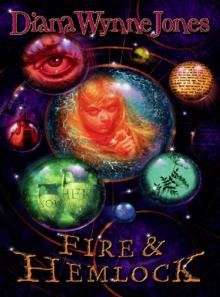 Fire and Hemlock
Fire and Hemlock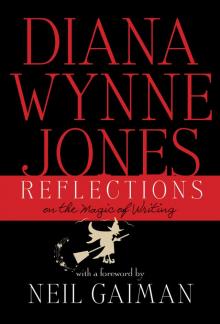 Reflections: On the Magic of Writing
Reflections: On the Magic of Writing The Game
The Game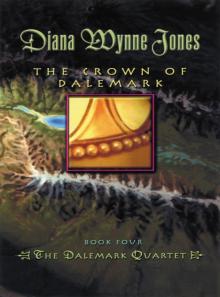 The Crown of Dalemark
The Crown of Dalemark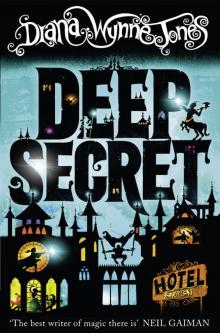 Deep Secret
Deep Secret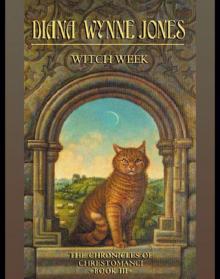 Witch Week
Witch Week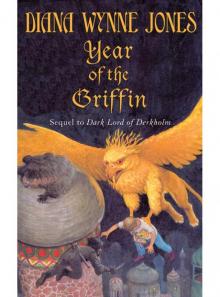 Year of the Griffin
Year of the Griffin Wild Robert
Wild Robert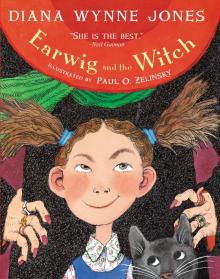 Earwig and the Witch
Earwig and the Witch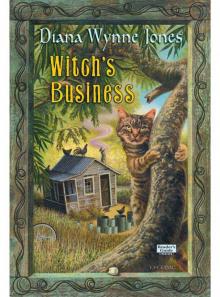 Witch's Business
Witch's Business Dogsbody
Dogsbody Caribbean Cruising
Caribbean Cruising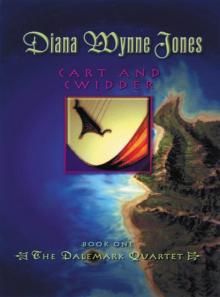 Cart and Cwidder
Cart and Cwidder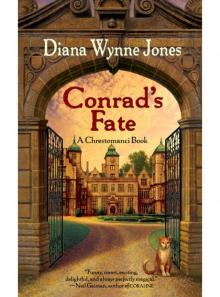 Conrad's Fate
Conrad's Fate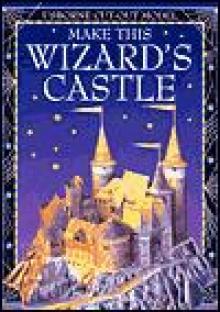 Howl's Moving Castle
Howl's Moving Castle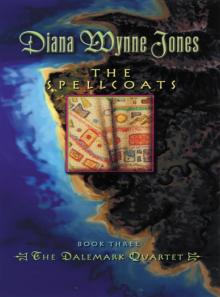 The Spellcoats
The Spellcoats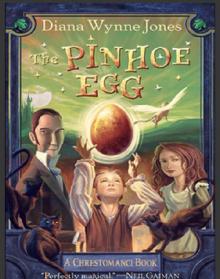 The Pinhoe Egg
The Pinhoe Egg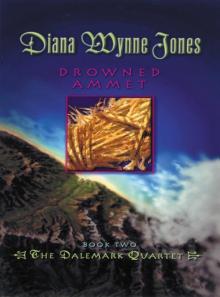 Drowned Ammet
Drowned Ammet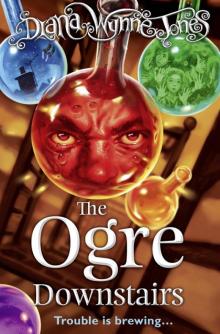 The Ogre Downstairs
The Ogre Downstairs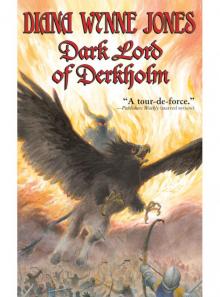 Dark Lord of Derkholm
Dark Lord of Derkholm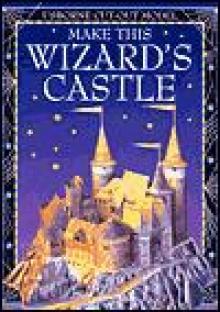 Castle in the Air
Castle in the Air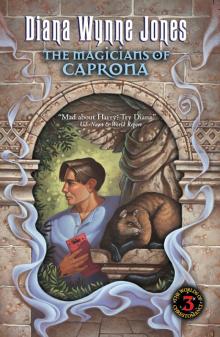 The Magicians of Caprona
The Magicians of Caprona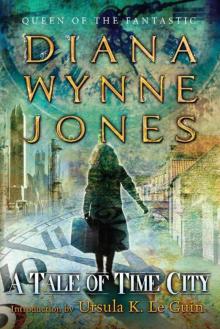 A Tale of Time City
A Tale of Time City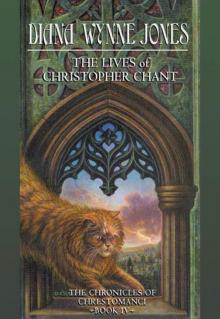 The Lives of Christopher Chant
The Lives of Christopher Chant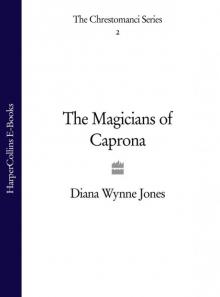 The Magicians of Caprona (UK)
The Magicians of Caprona (UK)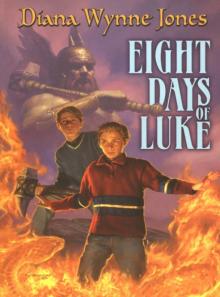 Eight Days of Luke
Eight Days of Luke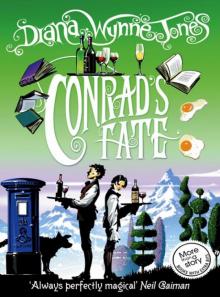 Conrad's Fate (UK)
Conrad's Fate (UK)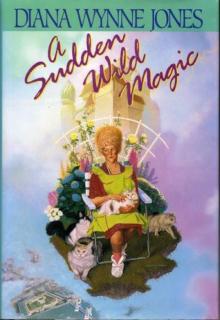 A Sudden Wild Magic
A Sudden Wild Magic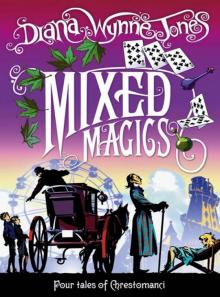 Mixed Magics (UK)
Mixed Magics (UK)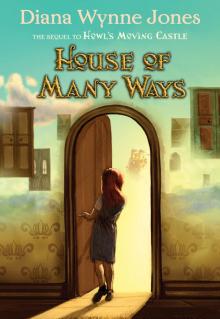 House of Many Ways
House of Many Ways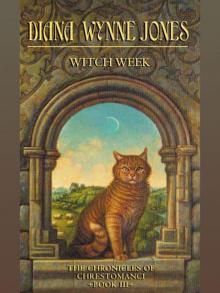 Witch Week (UK)
Witch Week (UK)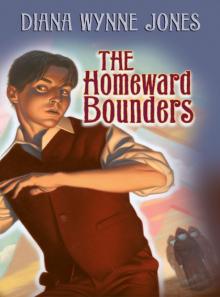 The Homeward Bounders
The Homeward Bounders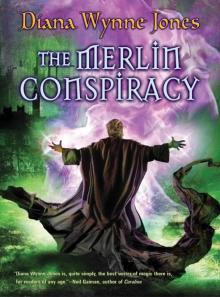 The Merlin Conspiracy
The Merlin Conspiracy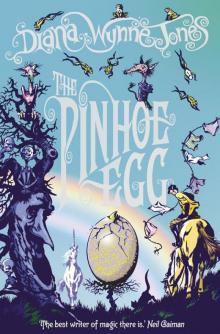 The Pinhoe Egg (UK)
The Pinhoe Egg (UK)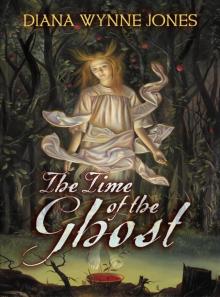 The Time of the Ghost
The Time of the Ghost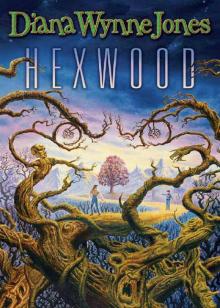 Hexwood
Hexwood Enchanted Glass
Enchanted Glass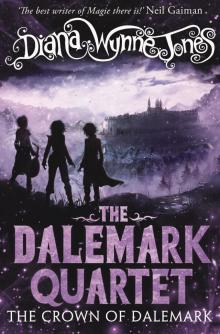 The Crown of Dalemark (UK)
The Crown of Dalemark (UK)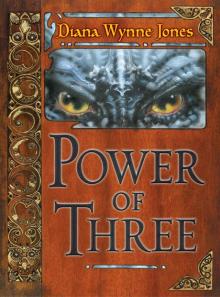 Power of Three
Power of Three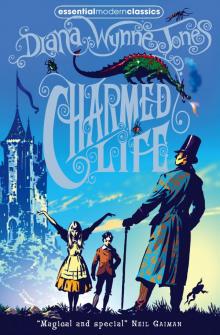 Charmed Life (UK)
Charmed Life (UK)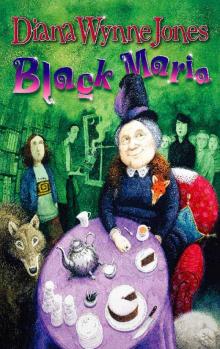 Black Maria
Black Maria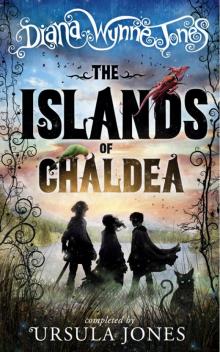 The Islands of Chaldea
The Islands of Chaldea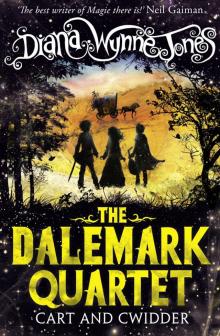 Cart and Cwidder (UK)
Cart and Cwidder (UK)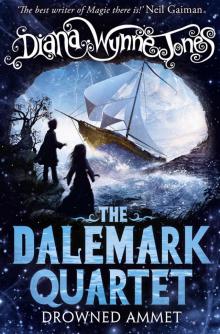 Drowned Ammet (UK)
Drowned Ammet (UK) Charmed Life
Charmed Life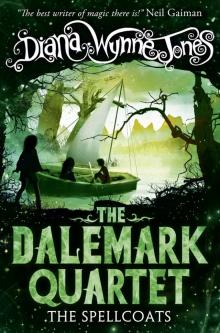 The Spellcoats (UK)
The Spellcoats (UK)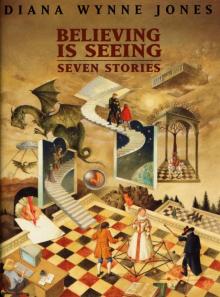 Believing Is Seeing
Believing Is Seeing Samantha's Diary
Samantha's Diary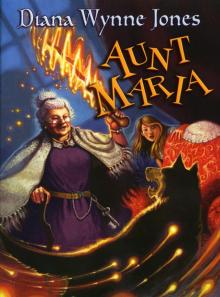 Aunt Maria
Aunt Maria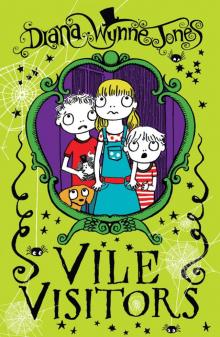 Vile Visitors
Vile Visitors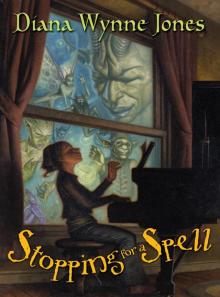 Stopping for a Spell
Stopping for a Spell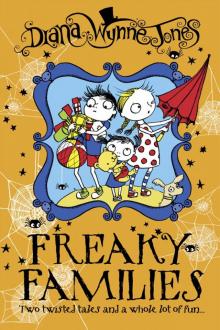 Freaky Families
Freaky Families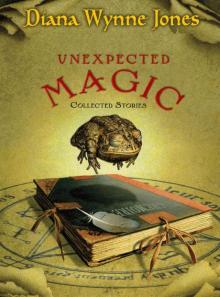 Unexpected Magic
Unexpected Magic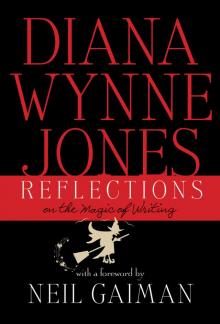 Reflections
Reflections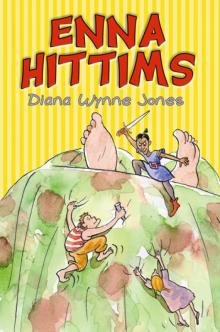 Enna Hittms
Enna Hittms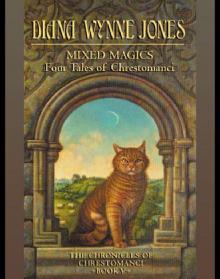 Mixed Magics: Four Tales of Chrestomanci
Mixed Magics: Four Tales of Chrestomanci